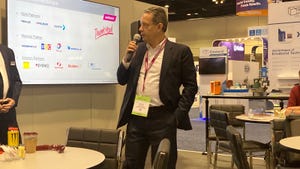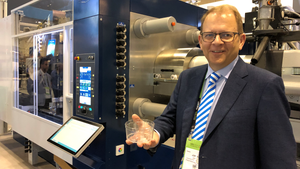The Business of Molding #12: Quoting With Profit In Mind
March 1, 1997
Editor's note: This series of articles on business relationships of custom molders is from Bill Tobin, of WJT Assoc., a consultant in injection molding who believes in looking at the molding business in the most practical way.
There is an old saying about quoting molding services (or anything else): If you bid too high you won't get the job and you'll lose the opportunity to make money. But if you bid too low, you probably will get the job and lose money twice: once for taking on a job that loses money, and once for tying up your capacity so that you cannot bid on more profitable jobs.
If there's a lesser of two evils, it is to err on the high side of the bid and not on the low side. But there are several tricks to quoting that will help you manage your costs so that the quote stays competitive.
Resin Inventory Management
Too many people who buy computerized costing programs, or write their own, or (because they are computer disadvantaged) still do it manually, miss a chance to enhance their profits. For example, we all know it is a mistake to quote a job whose annual material consumption will be about a truckload and quote the truckload price. (If you actually buy the truckload of resin, you are turning into a bank, because you'll have to pay that invoice well before you have converted the material into product.)
However, in your company's philosophy this might be the right thing to do. Many buyers have told me the worst blind sales call they can get is from a new custom molder that calls itself a "general purpose" molder. This means the company is willing to run anything out of any material. At the last bankruptcy auction I attended, there were about 20,000 lb of resin for sale. Unfortunately, there were more than 30 different types of plastic in dozens of grades and colors. The downfall of this company was trying to be all things to all customers.There is a highly successful "custom" molder whom I know of in the Rocky Mountain area that freely tells all its customers, "We will quote any part that is either clear high-impact polystyrene or natural high-density polyethylene in the medical industry."
It has silos of HDPE and HIPS and buys resin by the railcar. It quotes the material cost at 10 percent below the annualized resin cost for each part. In this way, each part stands on its own with only a slight discount, but the molder enjoys the benefit of distributing the cost of resin across his entire customer base. He further avoids the panic or delays involved with getting extra resin when one customer wants more product.
It is simply good business to pick a market segment where you can do a good job. And it's only smart to keep the number of different resins you process down to a minimum. This allows your people to perfect the processing of what you do well. Bundling your resin inventory and distributing it over several jobs gives you an added profit margin as well as minimizing the late deliveries because you ran out of material and couldn't replace it fast enough.
As your customer base gets bigger and you can assure the resin company of reasonably continuous consumption of resin, ask your distributor for consignment shipping. This way, you don't pay for the resin until you consume it. This aids your JIT position, and only carries the burden of the warehouse cost. However, the resin supplier will always insist that its sales force do the audit, and the molder always pays for the discrepancy if the audit comes up short. The pluses: the molder will always have a minimum amount of resin on hand he is not obligated to pay for until it is brought to the molding floor. The molder will also be able to enjoy the discount of higher volume shipments. The distributor has lower shipping costs and everybody wins. The customer must pay as though each job stood on its own or was bundled with other jobs from the same customer. He is usually unaware the molder has bundled several of his customers together for the additional profit.
The Specialist Strategy
Some start-up companies have used an interesting strategy to build their business base. They go to the larger molders in the area and offer to take the jobs that use "exotic" materials as a subcontractor. This is a winning situation for everyone. If you hunt around any geographic area, you'll find many customers have placed jobs in these exotic resins with their major molders. The amount of this work is insignificant to the large molders and they take it as a courtesy to their customers. However, if you pick up a subcontract PEEK job here and there, learn how to run it, and deliver it on time, this makes you the specialist.
Soon you've got enough jobs to dedicate a machine or two to do nothing but run exotic resins (or highly polished flat lenses, or tiny parts). Since the big molder only ran these jobs as a courtesy to his customer, in time he will suggest that his customer come to you (the specialist) directly.
Many molders will nobid jobs that use PVC. Their usual excuse is that it corrodes the equipment and molds and is dangerous to their people. However, this comes out of ignorance of not knowing how to process this resin. There are several highly profitable molders who specialize in running PVC. While it isn't an exotic resin, simply being able to do this successfully can be highly profitable.
Another trick is to specialize in a specific marketplace. Usually molders in automotive cannot compete with the folks in telecommunications. Look at the accounts you make the most profit with and how you can contribute to your customer's operation. While the customer/supplier relationship is strong, it is only long term if constantly nurtured. Keep in touch with your customers, help the designers design the parts and the buyers structure the purchase orders or analyze the quotes.
Automation
Too many people are convinced that you cannot get every mold to run fully automatic. In fact, every mold can unless it requires handloaded inserts. Many molders and moldmakers don't want to invest the time in building the mold properly or won't continue refusing it until it does run fully automatic. It is amazing how much profit can be made if you don't slow the cycle down so that the operator can trim the gates, but instead off-load parts with runners attached into a container.
With an air press to degate the shot, an operator can easily outrun the molding machine and still have time left over for other work. For those jobs that automatically degate, the few thousand dollars spent on a sprue separator that feeds directly into a grinder will be paid back in a matter of months compared to the cost of manual operation.
It is becoming increasingly common for molders to have robots on machines, even with family tools. Simple end-of-arm tooling can be developed that will degate parts and then spread them far enough apart from each other to easily drop them into individual chutes. This eliminates the operator having to sort the parts into individual boxes. While the robot is relatively expensive initially, it is a one-time expense, usually requiring only new end-of-arm tooling for different parts.
When purchasing a robot, simple is better. Most tasks can be accomplished with simple robots and intelligently designed end-of-arm tooling. Only in rare instances do you need to spend for a robot an amount equal to a worker's annual pay. Even reasonably sophisticated end-of-arm tooling is dramatically cheaper than an operator, and very quickly pays for itself even in moderate-volume tooling.
Many companies have robots but don't use them. The usual excuse is that the folks on the production floor didn't (wouldn't, couldn't) read/understand the instruction manual. If the folks on the floor don't understand how to use this piece of equipment, bring in the company rep and hold an in-house workshop on its use. Tell the manufacturer you want a video tape on how to use and program it. Try to get him to provide it in the language your operators speak.
Packaging
Packaging is a cost that is normally thought of as a pass-through cost. However, profit improvements can also be found here. Look in your parking lot. How many stacks of skids are there against the warehouse wall? You may have gotten a deal by buying a truckload every few months. But how much money do you have tied up? How many different sizes of boxes and bag liners do you have? Again, the fewer, the better.
With the help of an electronic spreadsheet, you should be able to go to your cardboard supplier and negotiate an annualized contract with biweekly deliveries. While you may be charging your customer the unit cost of a box based on a single purchase of boxes for each shipment, you'll be enjoying the volume discount price and not have to take up valuable warehouse space with cardboard.
Look at the tape you're using to close your boxes. Generally, people use one of three types: Plastic tape, plain paper, or fiber-reinforced paper tape. It is also a common practice to shrink or stretch wrap the boxes to the skid. Ask yourself why you are using (expensive) reinforced paper tape when nonreinforced paper tape would do? Will the least expensive tape hold the box closed while the stretch wrap keeps the boxes on the skid? If your answer is yes, you can save a lot of money going to kraft tape instead of the more expensive reinforced paper or plastic tape.
Fully automatic molding (molding without direct operator involvement), minimizing the different kinds of material you run by specializing, consignment resin purchasing, and minimizing the variety of packaging you must maintain - all these allow you long-term lower cost contracts than continually "spot" buying for each job. There's no need to pass these additional savings onto your customers because you manage your business intelligently. Keep the cash you've worked hard to position yourself to earn. The lesson here is to use everything you have that is in best interest of your company. Quote the jobs based on the small picture, but keep in mind the big picture. - Bill Tobin
You May Also Like


